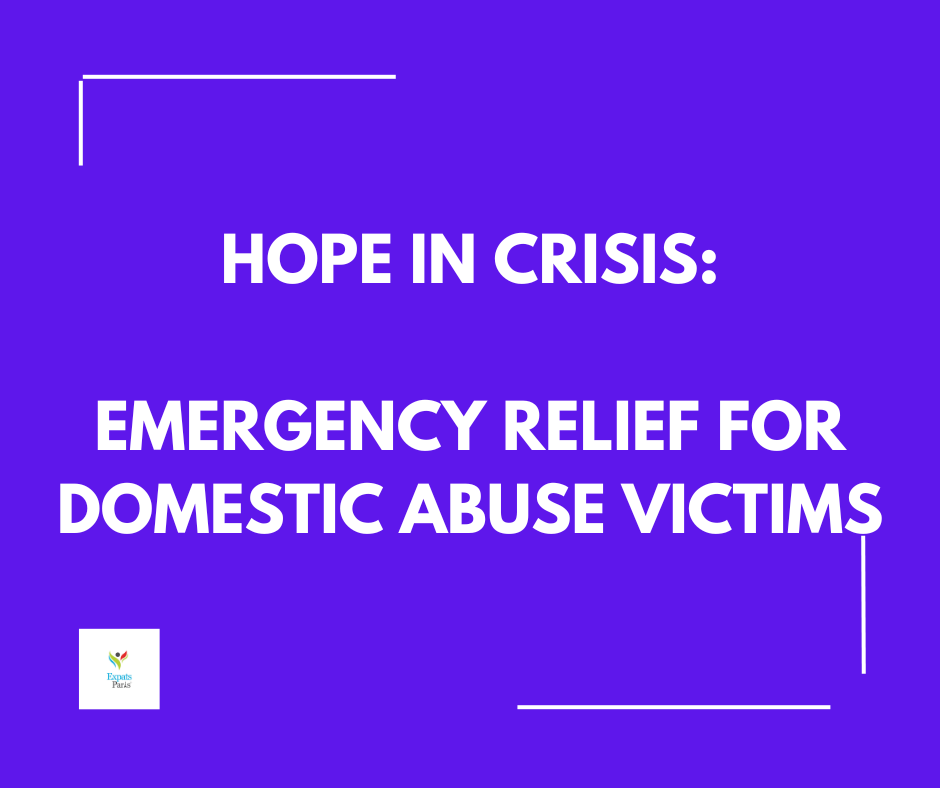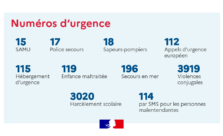For the community at Expats Paris, it’s essential to shed light on crucial local support systems, particularly for those confronting challenging situations like domestic violence.
As a Paris-based expatriate, navigating a new country can be daunting, and understanding the available support in times of crisis is vital.
Recognizing this, France has taken a significant step by introducing a comprehensive financial aid program for victims of domestic violence, set to be effective from December 1, 2023.
This initiative holds particular importance for the expat community, who may find themselves especially vulnerable when faced with such hardships far from their home countries.
Expats Paris is committed to ensuring that its community is well-informed and supported, making the coverage of this subject not just relevant but a critical aspect of our mission to assist expatriates in all facets of life in Paris.
The increase in domestic violence cases in France, with 244,000 victims recorded in 2022, highlights the importance of such support systems, especially for expats who might feel isolated.
Understanding the Financial Aid Program
Eligibility and Access
In the heart of Paris, a city known for its romance and charm, lies a harsher reality that often goes unnoticed – domestic violence. This aid program extends its support to any victim of domestic abuse, be it physical or psychological, inflicted by a spouse or partner. This inclusivity is particularly vital for expatriates, who might confront additional hurdles due to language barriers and unfamiliarity with local customs and laws.
Consider the story of Maria, an American expat in Paris. Despite her dreams of a picturesque life in France, she found herself in a nightmare of domestic abuse.
Struggling with the language and unaware of her rights, Maria felt trapped.
It’s for individuals like Maria that this aid becomes a lifeline.
Research indicates that expatriates are often at a higher risk of enduring abuse silently due to cultural dislocation and lack of support networks. This program aims to bridge that gap, ensuring that help is accessible to everyone, irrespective of their nationality or linguistic proficiency. It’s a beacon of hope, offering a way out for those who feel lost in the complexities of an expat life entangled with domestic strife.
Forms of Aid
The French government’s aid program for domestic violence victims comes with a tailored approach: victims can receive either a grant or an interest-free loan based on their financial situations.
This flexibility is crucial for expats too, who often navigate unique financial landscapes. For instance, consider Ana, a freelance graphic designer from Brazil, who moved to Paris for new opportunities. When faced with domestic violence, her irregular income made it difficult to seek help. The availability of a grant in her situation should be a lifeline, enabling her to leave an abusive environment without the added stress of financial instability.
Conversely, for expats like David, an IT professional from Canada with a stable income but sudden personal turmoil, an interest-free loan should provide the necessary support without the long-term financial burden.
Data from a study by the Expat Communication Group highlights that financial insecurity is one of the top concerns among expats, particularly those facing unexpected personal crises. The aid program’s dual approach of grants and loans addresses these concerns, offering a safety net that respects the diverse economic realities of the of citizens. This thoughtful design ensures that all victims, including expats, regardless of their financial standing, have access to the support they need in times of crisis.
Income Criteria for Grants
The financial aid program thoughtfully considers the varied economic situations of people through its income-based criteria for grants. For example, a single expat without dependents is eligible for a grant if their income is below 1.5 times the minimum wage (SMIC), currently about €2,029.59 net per month. This tiered approach is crucial in a city where expat incomes range widely.
Take, for instance, the case of Elena, a freelance journalist from Italy. Despite her hard work, her income fluctuates and often falls below the threshold. For Elena, the grant is not just financial aid; it’s a safety net that acknowledges her efforts and provides support in times of need.
This income-based eligibility is backed by data indicating that a significant portion of people in France work in sectors with variable incomes, such as arts, writing, and freelance consulting. The grant’s criteria ensure that those who contribute richly to the nation’s cultural fabric but might not have a steady income are not left without support in difficult times. This nuanced understanding of the financial landscape makes the aid program both inclusive and effective.
Loan Repayment
In the innovative structure of Paris’s aid program for domestic violence victims, the responsibility of loan repayment can be shifted to the perpetrator.
This approach is particularly impactful for many, especially expatriates, who often face financial constraints in a new country.
Consider the scenario of Sarah, an American teacher in Paris, who finds herself in an abusive relationship. With limited savings and no family support in France, the prospect of a loan for her escape seems daunting.
However, the program’s provision that the abuser is liable for the loan repayment offers her a way out without the added stress of financial debt.
This policy is supported by research indicating that financial dependency is a significant barrier for victims seeking to leave abusive relationships. By placing the onus of repayment on the perpetrator, the program not only provides immediate relief to the victim but also serves as a deterrent against future abuse.
For expats, who may lack a local support network and face additional legal and financial complexities, this aspect of the aid program is a crucial lifeline. It ensures that they can seek help without the fear of long-term financial repercussions, making it a model of compassionate and practical support.
Application Process
For victims of domestic violence, including expatriates in Paris, accessing financial aid involves navigating the local administrative system. Applications for this aid can be submitted through local family allowance offices (CAF) or agricultural social mutuality funds (MSA), available both in person and online.
Understanding this process is particularly crucial for expats, who may not be familiar with the French bureaucratic system.
For example, let’s consider Ana, a Brazilian graphic designer in Paris.
When she needed to apply for aid, her unfamiliarity with the system initially posed a challenge. However, by utilizing online resources and seeking guidance from local expat support groups, Ana was able to navigate the application process successfully.
It is widely known that expatriates in France often face hurdles in understanding and accessing local government services due to language barriers and unfamiliarity with the French bureaucracy.
In Paris, where the expat community is diverse and growing, the ability to access these services online is a significant advantage. It not only makes the process more efficient but also more accessible for those who might struggle with language barriers or mobility issues.
For expats, familiarizing themselves with these processes is not just about getting immediate aid; it’s about empowering themselves to utilize the full range of services available to them in their new home country.
This knowledge is a key component in ensuring their safety and well-being while living abroad.
Documentation Requirements
For a person seeking aid as a victim of domestic violence in France, the documentation requirements underscore the necessity of legal awareness.
Applicants are required to provide concrete evidence of the abuse, which may include a protection order, an official complaint, or a report filed with the public prosecutor.
Consider the case of Paolo, a Spanish expat in Paris, who faced domestic abuse.
Initially unaware of the legal procedures in France, he learned the hard way about the importance of formal documentation when seeking help. His journey highlights a critical point: for expats, being informed about the legal system and understanding the required documentation is crucial.
Data from the European Institute for Gender Equality indicates that many victims often face additional challenges in reporting abuse due to language barriers and lack of knowledge about the legal system in their host country.
This situation can lead to delays in seeking help and accessing support services.
Therefore, expats must educate themselves about the legal processes in their host country.
In Paris, various expat-focused legal aid services and support groups can guide on these matters.
Being prepared with the right documentation not only facilitates access to aid but also empowers expats to navigate the legal system more effectively in times of crisis.
The introduction of France’s financial aid program for domestic violence victims, commencing December 1, 2023, heralds a significant shift in support and care, especially for the expatriate community in Paris. This groundbreaking initiative goes beyond mere policy; it represents a vital lifeline, reflecting France’s dedication to safeguarding every individual within its borders, including those who have ventured far from their native homes to call Paris their new abode.
A Rallying Call to the Expat Community
Expats Paris emphasizes the importance of this program as a vital resource during crises. It stands as a beacon of hope, assuring expats that they are not isolated in their struggles. Whether grappling with financial, legal, or cultural challenges, this initiative is a robust pillar of support, ensuring that every expat in Paris can pursue a life free from violence and fear.
Disclaimer: This article provides information on emergency relief resources but does not replace professional advice. Seek assistance from relevant authorities and organizations for personalized help.
More information about this initiative can be found here: https://www.service-public.fr/particuliers/actualites/A16962



